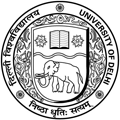Contact Information
-
location_on
Delhi, Delhi 110007, India
-
call
(011) 27667623 - 1653 (EPABX) - Deputy Registrar
-
mail_outline
(011) 27667524
-
email
- web_asset
Approved By: UGC AICTE NAAC
M.Phil. (Geography)
|
Duration: 2 Years |
Eligibility: M.A. (Geography) |
Course Duration: The M-Phil programme will be for two years. During the first year the students are expected to complete their course work (Phase I) and the next year for writing the dissertation (Phase II). The maximum period permissible for completion of course work will be two years. However, in exceptional cases, within the framework of the Ordinance VI an extension may be granted by the M-Phil Committee.
Course Eligibility : : Post Graduation in Geography with atleast 50% marks or Equivalent CGPA.
Admission Criteria: Merit in qualifying examination, subject to eligibility criteria.
Entrance/Eligibility Test: As per University Rules
Programme Mode: Regular
Course Syllabus
Part 1:
|
1. Research Methodology
|
|
2. Advanced Spatial Analysis
|
|
3. Any one among the following courses
|
Note:
In Course III the content of the course will be decided by the teacher concerned within the broad guidelines framed by the M.Phil. Committee from time to time. The basic objective of these courses is to train students in conceptualization and critical evaluation of research problem and research methodology. Courses shall be based on contemporary research issues in the major and allied areas.
Part 2:
|
Dissertation One Academic Year. |
Note:
On the successful completion of M.Phil. Part I, candidates shall be required to write a dissertation of 100-150 pages. A student who has secured 50 per cent marks in at least two courses including Course III (separately in written and internal assessment) of Part I examination may be allowed to proceed to M. Phil. Part II dissertation work. Such a student shall be permitted to submit his dissertation only when he has passed the examination in all the courses prescribed under Part I.

